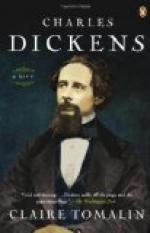Still, it may not be superfluous to inquire into the why and wherefore of his success. All effects have a cause. What was the cause of this special phenomenon? In the first place, the admirable freshness of the book won its way into every heart. There is a fervour of youth and healthy good spirits about the whole thing. In a former generation, Byron had uttered his wail of despair over a worthless world. We, in our own time, have got back to the dreary point of considering whether life be worth living. Here was a writer who had no such misgivings. For him life was pleasant, useful, full of delight—to be not only tolerated, but enjoyed. He liked its sights, its play of character, its adventures—affected no superiority to its amusements and convivialities—thoroughly laid himself out to please and to be pleased. And his characters were in the same mood. Their fund of animal spirits seemed inexhaustible. For life’s jollities they were never unprepared. No doubt there were “mighty mean moments” in their existence, as there have been in the existence of most of us. It cannot have been pleasant to Mr. Winkle to have his eye blackened by the obstreperous cabman. Mr. Tracy Tupman probably felt a passing pang when jilted by the maiden aunt in favour of the audacious Jingle. No man would elect to occupy the position of defendant in an action for breach of promise, or prefer to sojourn in a debtors’ prison. But how jauntily do Mr. Pickwick and his friends shake off such discomforts! How buoyantly do they override the billows that beset their course! And what excellent digestions they have, and how slightly do they seem to suffer the next day from any little excesses in the matter of milk punch!
Then besides the good spirits and good temper, there is Dickens’ royal gift of humour. As some actors have only to show their face and utter a word or two, in order to convulse an audience with merriment, so here does almost every sentence hold good and honest laughter. Not, perhaps, objects the superfine and too dainty critic, humour of the most delicate sort—not humour that for its rare and exquisite




